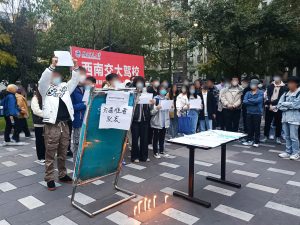In late November 2022, the Chinese internet was overwhelmed by expressions of grief and rage, despite the government’s best efforts to maintain its strict censorship of online dissent. The outpouring was triggered by a fire in Urumqi, capital of the western region of Xinjiang, that killed at least 10 people after harsh COVID-19 rules reportedly restricted the movement of victims and rescuers.
In the subsequent days, tens of thousands of people, many of them young, took to the streets across China to protest the government’s inhumane pandemic measures and denounce the authoritarian rule of the Chinese Communist Party (CCP). The White Paper protests, named for the blank sheets of paper that participants held up to mock official censorship, also drew widespread support from the Chinese diaspora, as thousands staged rallies in major cities from Paris to Sydney.
A year has passed since the demonstrations – the largest in China since the 1989 Tiananmen Square democracy movement – caught the world by surprise. Stringent censorship and surveillance, however, have made public commemorations inside the country nearly impossible. Words and names associated with the protests continue to be banned online, protest sites are cordoned off by police, and those who participated in 2022 still face police harassment.
Yet, as with the original protests, remembrance activities have spread internationally. At a rally I attended in Washington, D.C., a Chinese man, wearing a mask to protect his identity, called himself “a survivor” of the CCP’s zero-COVID policy and said it was his “privilege and duty” to speak up for the people who have been censored inside the country. During a commemoration rally in London, activist Ma Youwei told Radio Free Asia: “It’s very common to feel powerless as a Chinese person living in China. I wanted to get rid of that feeling. How? You do it through action.”
For many people in China, the biggest takeaway from the protests was that far more of their compatriots are deeply dissatisfied with the regime than they previously realized. Freedom House research shows that at least 72 protests were held across 17 provinces and regions during the last week of November 2022 alone. “I could not have possibly imagined that so many people would come today,” a protester in Shanghai said on the popular Chinese-language podcast Bumingbai.
Similar sentiments were shared among Chinese protesters in the diaspora. A student who organized an on-campus protest in the United States told me: “I thought only the people I already knew would turn up. Then I saw like 300 people!” A computer programmer who attended a protest in front of the Chinese consulate in New York said: “I spotted my colleague in the crowd. All these years I have worked with him, I had no idea he loathes the CCP just as I do!”
The knowledge that “I am not alone” has been tremendously empowering. People have since felt emboldened to approach classmates and coworkers to talk about Chinese politics, to organize events offline, and to share information and thoughts online. Anonymous social media accounts born out of the protests continue to gain followings, serving as focal points for news and debate. In the past year, I have attended many private gatherings with activists, students, and professionals of mainland Chinese origin, where we discussed ideas about human rights and democracy.
Another notable feature of the White Paper protests was the large share of female participants. Many of them gained organizing experience through their participation in China’s women’s rights movement, which continues to thrive despite unrelenting government repression. Unlike the older generation of pro-democracy activists, the young people who are at the forefront of activism today care not only about the CCP’s authoritarian rule, but also about China’s patriarchal society and deep-rooted discrimination against LGBTQ+ groups. They care not just about the human rights of Han Chinese people, but also about those of Uyghurs and Tibetans.
Many young people recognize that they might be the oppressed in one context and the oppressor in another, and that the struggle for a truly democratic China – one that protects not just the political freedom of dominant, privileged groups, but also the dignity and rights of the marginalized and dispossessed – could take generations. This level of awareness regarding the complexity of authoritarian repression is unprecedented.
I’ve also increasingly seen young Chinese activists get involved in the human rights causes of other countries. In the United States, they have gone to pro-Palestinian rallies, George Floyd protests, and demonstrations supporting women and freedom in Iran. In recent weeks, the Instagram account of the anonymous activist group Citizen Daily CN has posted messages urging people to pay attention to the situation in Gaza. A growing number of young people view themselves as part of a global struggle for freedom and human rights, and believe that solidarity with other oppressed people around the world is a moral imperative. This level of international perspective is equally unprecedented.
As Washington and Beijing engage more and more overtly in geopolitical competition, we should not lose sight of the passionate longing for freedom that people in China are trying to express. We should support their aspirations at every opportunity.

































